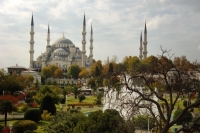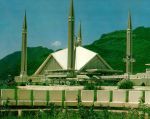I look at this world and wonder how it would be in the future, I also look at this world and sometimes wonder how it would have been. In the past year or so I see Sudan split into two, I  hear voices of dissent as fears of Syria being carved up are discussed, or Iraq, Yemen or Mali, of more and more lands in Al Quds being lost to the ever enlarging Israeli state. What this indicates is that in the past few years the world has changed, more boundaries have been drawn, more nations have been created, more people attempting to redefine themselves on who they are. And as the world changes our memories become ever more significant of what the world was like.
hear voices of dissent as fears of Syria being carved up are discussed, or Iraq, Yemen or Mali, of more and more lands in Al Quds being lost to the ever enlarging Israeli state. What this indicates is that in the past few years the world has changed, more boundaries have been drawn, more nations have been created, more people attempting to redefine themselves on who they are. And as the world changes our memories become ever more significant of what the world was like.
But while these new nation states come into being, so do memories. New memories, are based on old themes, as people are attached to memories they know not. Palestinians are reminded of a people called the Philistines, and how they are in some way attached to that. The so called non Arabs of South Sudan are reminded of their tribal affiliations of the past, and how they are different from their Northern Sudanese brethren. History is distorted, history is changed, memories are distorted, memories are changed, memories are changed to legislate, memories are changed to legislate a border, in simple terms, geography.
How absurd to assume that Pakistan and India were one, how absurd to imagine that from Bosnia to Yemen, from Iraq to Algeria that all these nations were one.
But why is this done? Why are people reminded of their past, a past that they do not know? Why are they indoctrinated, why are memories changed, or re-invented. Simple, as memories, real memories distort geography. Memories tell us that before 1995-96 there was no Bosnia, before 1944-45 there was no Kashmir, Pakistan nor India. And before the Sykes and Picot agreement, end of World War I, there was no Israel, Syria, Turkey and all the other nations states that emerged from the fall of the Ottoman State.
What recent Islamic history tells us is that the Ottoman State was carved up, as booty, spoils of war by the Imperialist powers. Who all took their pickings of bits of land that they fancied. And by doing so they attempted to reinvent the peoples on the new lines of geography created. And the longer the Ottoman State is out of our memories and the longer these borders manifest as symbols of eternal boundaries, we start to believe that this is how the world always was, that the idea of unification is far fetched, that the attempts by the Islamic world of unity are impossible. The simple fact is that our memories find it hard to fathom a  geography where all the Ottoman nation states were one. Our memories still find it even harder to fathom that Pakistan, Bangladesh, and India were considered one nation 60 odd years ago. Turkey, the successor state of the Ottoman State, continues to remind us that it was always Turkish, that their culture, language and history was always Turkish, and yet this is so far from the truth, and yet say this to a nationalist Turk and he/she will remind you that from being a vast multi-ethnic State to a small Turkish nation state was the best thing to ever happen to the Turks, that from being rulers of the world to rulers of a tiny nation is the best thing that they could ever have hoped for, how low our standards have become. But this is not exclusive to Turkey as the peoples of Syria and Iraq tell me of the same, they tell me of belonging to a nation, how someone in Mosul is proud to be an Iraqi, even though they have more in common with the people in Aleppo in Syria than in Basra. Or the People in Qamishli are proud to be Syrian even though they have more common to the peoples of Diyabekir in Turkey than Damascus. What they seem to forget that in reality they all have more in common with each other, but not on grounds of nationalism but on ideals. Our memories, seem to only remember the now, and yet we talk of history, but not of glorious past, but of immediate present. The recent history of nation is our idea of unity, and yet the communities seemed so imagined.
geography where all the Ottoman nation states were one. Our memories still find it even harder to fathom that Pakistan, Bangladesh, and India were considered one nation 60 odd years ago. Turkey, the successor state of the Ottoman State, continues to remind us that it was always Turkish, that their culture, language and history was always Turkish, and yet this is so far from the truth, and yet say this to a nationalist Turk and he/she will remind you that from being a vast multi-ethnic State to a small Turkish nation state was the best thing to ever happen to the Turks, that from being rulers of the world to rulers of a tiny nation is the best thing that they could ever have hoped for, how low our standards have become. But this is not exclusive to Turkey as the peoples of Syria and Iraq tell me of the same, they tell me of belonging to a nation, how someone in Mosul is proud to be an Iraqi, even though they have more in common with the people in Aleppo in Syria than in Basra. Or the People in Qamishli are proud to be Syrian even though they have more common to the peoples of Diyabekir in Turkey than Damascus. What they seem to forget that in reality they all have more in common with each other, but not on grounds of nationalism but on ideals. Our memories, seem to only remember the now, and yet we talk of history, but not of glorious past, but of immediate present. The recent history of nation is our idea of unity, and yet the communities seemed so imagined.
While borders are drawn, ideas of nations are created, where imagined communities are created. So why should someone in the province of Sindh, Pakistan, have commonality with the peoples of Punjab, and yet have nothing in common with neighboring villages in Gujrat, India. Simple! They are now within the borders of  Pakistan, they are now an exclusive community, within the boundaries of geography. The point I stress, is that, how a commonality is formed based on borders anew, how an imagined community is created as if it has always been that way based on a geography that is current. How absurd to assume that Pakistan and India were one, how absurd to imagine that from Bosnia to Yemen, from Iraq to Algeria that all these nations were one. How absurd to even imagine that a community that was one can be one again. Instead I am forced to change my memories, my memories that challenge imagined communities, that distort geography. Luckily for me, there are still those who remember, there are those who have written down the past and of borders with more broader lines.
Pakistan, they are now an exclusive community, within the boundaries of geography. The point I stress, is that, how a commonality is formed based on borders anew, how an imagined community is created as if it has always been that way based on a geography that is current. How absurd to assume that Pakistan and India were one, how absurd to imagine that from Bosnia to Yemen, from Iraq to Algeria that all these nations were one. How absurd to even imagine that a community that was one can be one again. Instead I am forced to change my memories, my memories that challenge imagined communities, that distort geography. Luckily for me, there are still those who remember, there are those who have written down the past and of borders with more broader lines.
For it is not a nation that defines me, nor borders or imagined communities. Should we not be defined by the ideas we carry? Should we not be defined by what we stand for? And what about our history? Should we not attempt to go back and understand that we have a deeper past, and for those who say that history doesn't repeat itself, well, only time will tell, but just as history has taught us that new nations can be created, likewise I believe a new formation can also be created, one that has far larger borders, just like in the past. I say, it's time to evaluate out imagined communities, and go back to our collective memories so that we can derive to a truth, a truth that tells us that our memories can distort geography.
